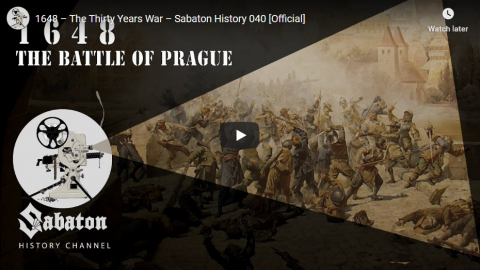Extra Credits
Published 7 Nov 2019Start your Warframe journey now and prepare to face your personal nemesis, the Kuva Lich — an enemy that only grows stronger with every defeat. Take down this deadly foe, then get ready to take flight in Empyrean! Coming soon! http://bit.ly/EHWarframe
As the Renaissance breathes new life into Europe, Copernicus develops mathematical proofs for the sun resting in the center of the universe. And from his works, a new world is born. The scientific world gets faster and faster. Revolutions of all kinds begin to set off chains of events that reshape human history. And as science improves, so do the tools of war. Both will be necessary to propel humanity to the stars. Join us on this race through the scientific works between the Renaissance and the Industrial Revolution.
Copernicus’ publishing really came down to the wire! Legend has it that he was given the final printed pages on his death bed. When they presented him with the book, he awoke from a coma, saw his life’s work and finally passed away in peace. Or so the story goes.
November 9, 2019
History of Space Travel – Revolutions – Extra History – #2
“1648” – The Thirty Years War – Sabaton History 040 [Official]
Sabaton History
Published 7 Nov 2019Europe had grown weary of war by the summer of 1648 and after much deliberation, peace talks in Westphalia had reached their final stages. Warlords across the entire continent were preparing for peace but not all of them agreed. The exceptionally ruthless German-Swedish General Königsmarck advanced into Bohemia to lay siege to Prague.
Support Sabaton History on Patreon: https://www.patreon.com/sabatonhistory
Listen to Carolus Rex (Where “1648” is featured):
CD: http://bit.ly/CarolusRexStore
Spotify: http://bit.ly/CarolusRexSpotify
Apple Music: http://bit.ly/CarolusRexAppleMusic
iTunes: http://bit.ly/CarolusRexiTunes
Amazon: http://bit.ly/CarolusRexAmz
Google Play: http://bit.ly/CarolusRexGooglePlayListen to Sabaton on Spotify: http://smarturl.it/SabatonSpotify
Official Sabaton Merchandise Shop: http://bit.ly/SabatonOfficialShopHosted by: Indy Neidell
Written by: Markus Linke and Indy Neidell
Directed by: Astrid Deinhard and Wieke Kapteijns
Produced by: Pär Sundström, Astrid Deinhard and Spartacus Olsson
Creative Producer: Joram Appel
Executive Producers: Pär Sundström, Joakim Broden, Tomas Sunmo, Indy Neidell, Astrid Deinhard, and Spartacus Olsson
Maps by: Eastory
Edited by: Iryna Dulka
Sound Editing by: Marek KaminskiEastory YouTube Channel: https://www.youtube.com/channel/UCEly…
Archive by: Reuters/Screenocean https://www.screenocean.com
Music by Sabaton.Sources:
– Thumbnail image: Petri Krohn, CC BY-SA 3.0.
– Les misères et les malheurs de la guerre – The British Museum
– “Germania: dos mil años de historia alemana” series from Fondo Antiguo de la Biblioteca de la Universidad de Sevilla
– The peace of Munster painting courtesy of Amsterdam Museum
– RijksMuseumAn OnLion Entertainment GmbH and Raging Beaver Publishing AB co-Production.
© Raging Beaver Publishing AB, 2019 – all rights reserved.
From the comments:
Sabaton History
2 days ago
This episode about “1648” is about peace and about a devastating and deadly siege to Prague. We enjoy doing these episodes as we usually only make episodes about more modern topics. Now, we have to do without film and photo material, and be creative with paintings and sketches. Kudos to the editor Iryna who makes that work brilliantly! If you agree and want to support our work, you can do so by going to our Patreon page: https://www.patreon.com/sabatonhistoryCheers, the Sabaton History team.
The Milk Dud and “sin”
Chris Selley believes that introducing the notion of “sin” as an appropriate thing to discuss with a politician will be a very bad idea for Canadian politics:

Andrew Scheer, paid tool of Big Dairy, chugs some milk during a Press Gallery speech in 2017. I’ve called him the “Milk Dud” ever since.
Screencapture from a CTV video uploaded to YouTube.
At a Wednesday press conference in Ottawa, a Globe and Mail reporter asked Andrew Scheer if he believes homosexuality is a “sin.” He didn’t answer, as has become his trademark on this file; instead he pledged, for the umpteenth time, simply to stand up for gay rights in all their forms.
It has been maddening to watch: Despite literally dozens of opportunities, he could never bring himself to explicitly support equal marriage. Bringing “sin” into the question is a novelty, though, and it’s one of which we need to be exceedingly leery.
[…]
The question of “sin” takes us into new and dangerous territory, however. There is what politicians do, and then there is what they think, and then — buried way down under many layers of irrelevance — there is their personal relationship, if any, with higher powers and their associated scriptures; there is the question of what they think that higher power would make of other people’s behaviour; there is what they believe will happen to those people’s immortal souls.
These are not topics the secular media should be concerning themselves with, and nor should the average voter. No one would approve of someone they like being put through such an inquisition. Liberals would be aghast if their avowedly Catholic leader were asked if his faith played a role in his government not eliminating restrictions on gay and bisexual men donating blood, for example. Liberals often speak glowingly of the days when politicians set aside religion and pursued the greater good — politicians like Pierre Trudeau, a devout Catholic who famously said “what goes on in private between two consulting adults is their own private business,” but who somewhat less famously spoke of “separating the idea of sin and the idea of crime.”
Trudeau Sr. was absolutely right that the state should have no dominion over sin, in any sense of the word. That should go for politics, too. Politicians of known faiths and devoutness have advanced many of progressive Canadians’ most cherished causes — public health care, most notably — and politicians of unknown faiths and devoutness have taken us down dark alleys. And vice versa. There is nothing we can do with information about a politician’s personal metaphysical views except raise new barriers to entry into a politics that needs fewer.
Ten Minute English and British History #11 – King John and the Magna Carta
History Matters
Published 1 Jan 2018Twitter: https://twitter.com/Tenminhistory
Patreon: https://www.patreon.com/user?u=4973164This episode covers the reign of King John and the problems he had securing the Angevin inheritance and the subsequent issues his barons posed. These problems culminated in the signing of the Magna Carta in 1215 which severely limited the strength of John and his son, Henry III, whose reign was overshadowed by the document.
Ten Minute English and British History is a series of short, ten minute animated narrative documentaries that are designed as revision refreshers or simple introductions to a topic. Please note that these are not meant to be comprehensive and there’s a lot of stuff I couldn’t fit into the episodes that I would have liked to. Thank you for watching, though, it’s always appreciated.
QotD: British Cookery
When Voltaire made his often-quoted statement that the country of Britain has “a hundred religions and only one sauce”, he was saying something which was untrue and which is equally untrue today, but which might still be echoed in good faith by a foreign visitor who made only a brief stay and drew his impressions from hotels and restaurants. For the first thing to be noticed about British cookery is that it is best studied in private houses, and more particularly in the homes of the middle-class and working-class masses who have not become Europeanised in their tastes. Cheap restaurants in Britain are almost invariably bad, while in expensive restaurants the cookery is almost always French, or imitation French. In the kind of food eaten, and even in the hours at which meals are taken and the names by which they are called, there is a definite cultural division between the upper-class minority and the big mass who have preserved the habits of their ancestors.
Generalising further, one may say that the characteristic British diet is a simple, rather heavy, perhaps slightly barbarous diet, drawing much of its virtue from the excellence of the local materials, and with its main emphasis on sugar and animal fats. It is the diet of a wet northern country where butter is plentiful and vegetable oils are scarce, where hot drinks are acceptable at most hours of the day, and where all the spices and some of the stronger-tasting herbs are exotic products. Garlic, for instance, is unknown in British cookery proper: on the other hand mint, which is completely neglected in some European countries, figures largely. In general, British people prefer sweet things to spicy things, and they combine sugar with meat in a way that is seldom seen elsewhere.
Finally, it must be remembered that in talking about “British cookery” one is referring to the characteristic native diet of the British Isles and not necessarily to the food that the average British citizen eats at this moment. Quite apart from the economic difference between the various blocks of the population, there is the stringent food rationing which has now been in operation for six years. In talking of British cookery, therefore, one is talking of the past or the future – of dishes that the British people now see somewhat rarely, but which they would gladly eat if they had the chance, and which they did eat fairly frequently up to 1939.
George Orwell, “British Cookery”, 1946. (Originally commissioned by the British Council, but refused by them and later published in abbreviated form.)






